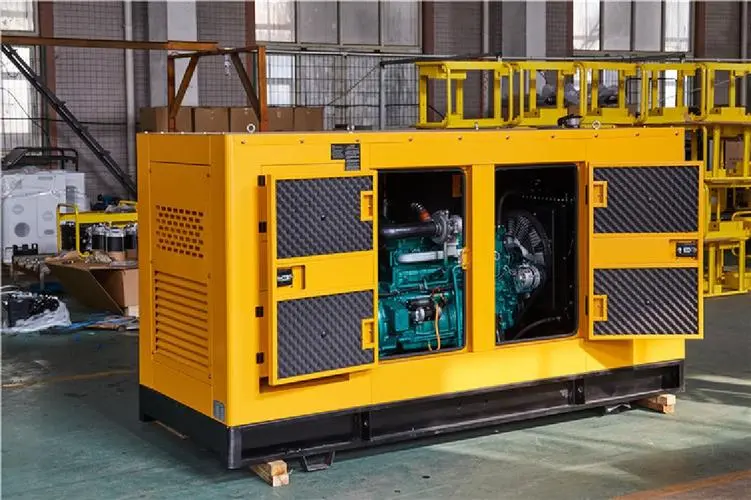Introduction
Diesel generators are a critical component of many industries, providing reliable power backup during outages or in remote locations where grid power is unavailable. These generators are known for their durability, efficiency, and ability to produce high power output. However, in order to ensure optimal performance and efficiency, it is essential to implement strategies for optimization. This article will explore various techniques and best practices for maximizing the efficiency of diesel generators, ultimately leading to cost savings, reduced environmental impact, and improved overall performance.
1. Understanding Diesel Generator Efficiency
Before delving into strategies for optimizing diesel generator efficiency, it is important to understand the factors that influence the efficiency of these power sources. Efficiency in a diesel generator refers to the ability of the generator to convert the energy stored in diesel fuel into electrical power. Several key factors impact the efficiency of a diesel generator, including:
- Engine Design: The design and quality of the engine play a significant role in determining the efficiency of a diesel generator. Modern diesel engines are designed to be more fuel-efficient and produce higher power output compared to older models.
- https://www.lkpowerplant.com/60kw-150kw/ : The load factor, or the percentage of the generator's rated capacity being utilized, also affects efficiency. Running a diesel generator at a partial load can result in lower efficiency compared to running it at its full capacity.
- Maintenance: Regular maintenance and servicing of the diesel generator are crucial for ensuring optimal efficiency. A well-maintained generator will operate more efficiently and reliably than one that is neglected.
- Fuel Quality: The quality of the diesel fuel used in the generator can impact its efficiency. High-quality fuel with the right specifications and additives can improve combustion efficiency and reduce emissions.
2. Strategies for Optimizing Diesel Generator Efficiency
To maximize the efficiency of a diesel generator, it is important to implement various strategies and best practices. These strategies are aimed at improving fuel consumption, reducing emissions, and enhancing overall performance. The following are some key strategies for optimizing diesel generator efficiency:
- Proper Sizing: One of the most important factors in optimizing diesel generator efficiency is ensuring that the generator is properly sized for the intended load. Undersized generators will operate inefficiently when running at full capacity, while oversized generators will consume excess fuel when running at partial load.
- Load Management: Efficient load management is essential for maximizing the efficiency of a diesel generator. By balancing the load across multiple generators or using load-shedding techniques, operators can ensure that the generator is operating at its optimal capacity.
- Regular Maintenance: Regular maintenance and servicing are crucial for ensuring the efficiency and longevity of a diesel generator. This includes tasks such as changing filters, checking oil levels, inspecting belts and hoses, and testing the battery.
- Fuel Quality: Using high-quality diesel fuel that meets the recommended specifications is essential for optimizing generator efficiency. Contaminated or low-quality fuel can lead to poor combustion, reduced power output, and increased emissions.
- Operating Conditions: The operating conditions of the diesel generator also play a significant role in its efficiency. Factors such as ambient temperature, altitude, and humidity can impact the performance of the generator and should be taken into consideration when optimizing efficiency.
- Fuel Efficiency Technologies: Various technologies can be incorporated into diesel generators to improve fuel efficiency. These include features such as electronic control systems, variable-speed drives, and advanced combustion systems.

- Energy Storage Systems: Integrating energy storage systems, such as batteries or capacitors, with diesel generators can help improve efficiency by providing additional power during peak demand periods or allowing for load-shifting.
- Remote Monitoring and Control: Implementing remote monitoring and control systems enables operators to track the performance of the diesel generator in real-time and make adjustments to optimize efficiency.
3. Case Studies and Examples
To illustrate the practical application of the strategies discussed above, let's consider a few case studies and examples of how organizations have successfully optimized the efficiency of their diesel generators.
Case Study 1: Industrial Manufacturing Plant
A large industrial manufacturing plant in a remote location relies on diesel generators for backup power during outages. To optimize the efficiency of their generators, the plant implemented a comprehensive maintenance program that included regular servicing, fuel quality testing, and load management practices. By ensuring that the generators were properly maintained and operated at their optimal capacity, the plant was able to reduce fuel consumption by 15% and lower emissions by 20%.
Case Study 2: Data Center Facility
A data center facility with multiple diesel generators for backup power faced challenges related to load management and fuel efficiency. By installing load-shedding systems and implementing energy storage solutions, the facility was able to improve the overall efficiency of its generators. Additionally, the facility adopted remote monitoring and control systems to track performance and make real-time adjustments, leading to a 10% reduction in fuel consumption and improved reliability.
4. Conclusion
Optimizing the efficiency of diesel generators is essential for reducing costs, minimizing environmental impact, and ensuring reliable power backup. By understanding the factors that influence generator efficiency and implementing the strategies outlined in this article, organizations can maximize the performance of their generators and achieve significant benefits. From proper sizing and load management to regular maintenance and fuel quality control, there are numerous ways to enhance the efficiency of diesel generators. By investing in these optimization strategies, businesses can improve their operational efficiency, reduce their carbon footprint, and enhance their overall competitiveness in the market.
